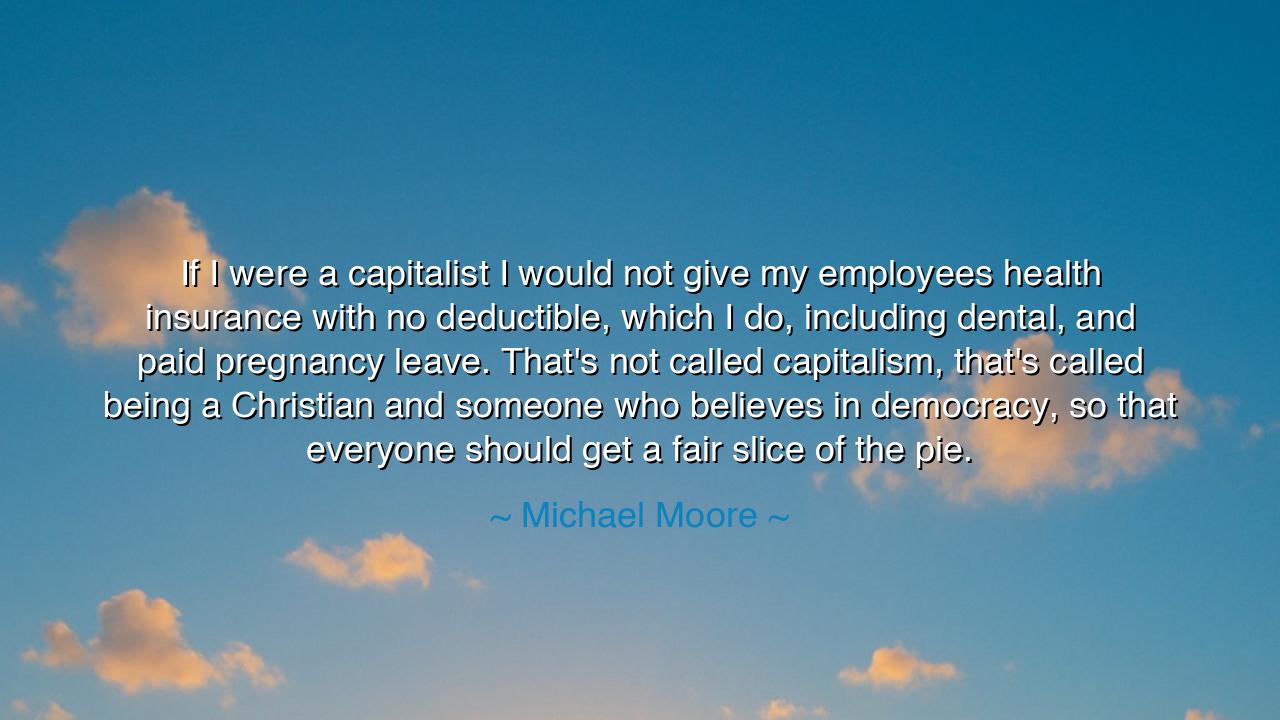
If I were a capitalist I would not give my employees health
If I were a capitalist I would not give my employees health insurance with no deductible, which I do, including dental, and paid pregnancy leave. That's not called capitalism, that's called being a Christian and someone who believes in democracy, so that everyone should get a fair slice of the pie.






Hearken, O children of generations yet unborn, and attend to the words of Michael Moore, who spoke with passion and conviction: “If I were a capitalist I would not give my employees health insurance with no deductible, which I do, including dental, and paid pregnancy leave. That's not called capitalism, that's called being a Christian and someone who believes in democracy, so that everyone should get a fair slice of the pie.” In these words lies a meditation on justice, compassion, and the moral duties of those who wield power, a truth as ancient as the laws of kings and the decrees of philosophers who sought fairness and the common good.
Consider first the distinction between profit and responsibility. Moore contrasts the cold logic of capitalism with the warm logic of ethics, faith, and civic duty. History is filled with rulers who amassed wealth while neglecting the welfare of their people, and with those rare leaders who understood that the measure of a society is found not in riches alone but in how equitably it shares its blessings. Moore reminds us that the act of providing care is not merely business, but a moral covenant with humanity.
The phrase “everyone should get a fair slice of the pie” echoes the ideals of democracy and justice. In the republics of old, from Athens to Rome, philosophers debated how wealth and resources might be distributed to prevent the ruin of the many for the enrichment of the few. Moore’s words are a modern echo: fairness is not charity, but the foundation of a stable, virtuous, and thriving society. To care for employees, to extend health and security, is to honor both morality and civic harmony.
Moore also invokes faith and humanity, noting that his actions are guided not by the profit motive but by a belief in Christian compassion. Consider the example of Saint Basil in Byzantium, who established hospitals and charitable institutions, providing care to the poor and sick. Wealth and power were instruments for the service of others, and their value was measured by the lives they sustained. Similarly, Moore frames employee care as a moral duty, an extension of ethical conviction rather than a business transaction.
The mention of paid pregnancy leave, dental, and comprehensive health insurance is not merely practical, but symbolic. It demonstrates the care and foresight required to nurture life, support families, and protect the vulnerable. History teaches that societies flourish when leaders prioritize the well-being of all members: in medieval guilds, apprentices were cared for as part of the collective, and communal support ensured skill, stability, and growth. Moore’s example illustrates that investing in humanity enriches both society and enterprise.
From this reflection emerges a timeless lesson: true leadership balances power with responsibility, wealth with compassion, and efficiency with ethics. The generosity of spirit is not weakness; it is a stabilizing and empowering force, one that ensures prosperity is shared and society endures. Moore reminds us that capitalism need not be synonymous with exploitation; it can coexist with morality, fairness, and communal care.
Practical action flows naturally from this wisdom. Treat those under your stewardship with fairness and dignity. Provide resources, protection, and opportunity, not merely as obligation, but as a manifestation of moral and civic duty. Advocate for systems and structures that ensure a fair distribution of wealth, support, and security. In doing so, you create not only trust and loyalty but the foundations for a just and thriving community.
Finally, remember the eternal truth: wealth and power are instruments, and their virtue is measured by how they are wielded. Michael Moore’s words are a call to conscience: serve humanity with generosity, uphold justice in practice, and ensure that all share in the bounty of society, for in fairness, compassion, and care, civilization endures and prospers.
If you wish, I can also craft a narration-ready version of this reflection, with rises and falls that emphasize both the moral gravity and heroic resonance of Moore’s insight.






AAdministratorAdministrator
Welcome, honored guests. Please leave a comment, we will respond soon